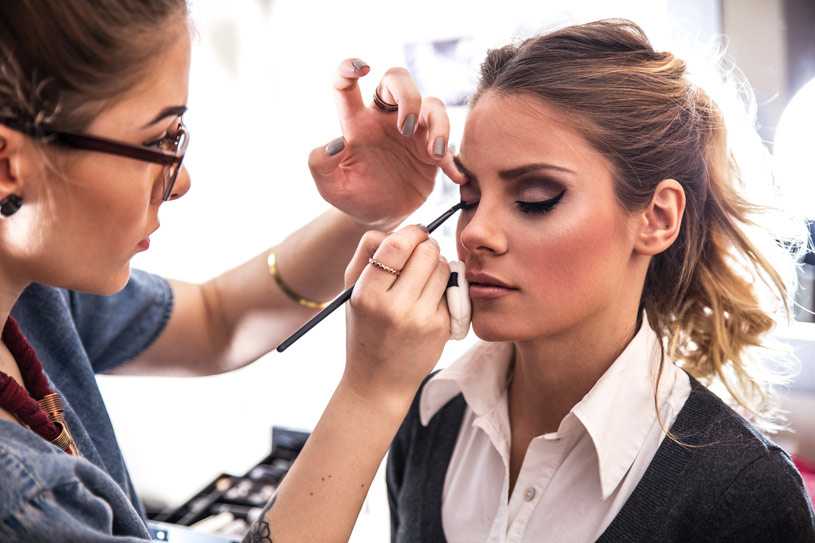How to become a makeup artist — a step-by-step guide
5-minute read

If you’re a wizard with a blusher brush and a pro with a lip liner, becoming a makeup artist could be a great career choice.
Our step-by-step guide will help you get going, from getting qualified to finding clients as a freelance makeup artist.
The role of a makeup artist
A makeup artist is a specialist in cosmetics, who uses artistic skill and makeup products to enhance someone’s natural features or to change how they look.
Makeup artists are often employed to do makeup for weddings and other special events, and for modelling shoots, theatre productions, film and TV shows.
Makeup artists who work on films and other productions may use special makeup techniques to radically change an actor’s appearance, for example to make them look much older than they are, or to make them look like they’ve been in a fight.
Although you may be able to find an employed role in the industry, it’s common to work on a self-employed basis as a freelance makeup artist.
Is it hard to become a makeup artist?
If you love cosmetics and you have an artistic flair, it shouldn’t be too difficult for you to complete a makeup artist course and build a portfolio.
However, actually becoming a successful makeup artist is much harder. Because there isn’t a set career path and most makeup artists are self-employed, it tends to take skill, dedication and time to build up a client base and get regular work as a makeup artist.
How much does a makeup artist make?
Our data show that the makeup artists we insure earned an average turnover of:
- £27,324 in 2021
- £27,285 in 2020
- £26,404 in 2019
- £27,205 in 2018
- £29,194 in 2017
According to talent.com, the average makeup artist salary in the UK is £39,000 (based on 52 salaries). The National Careers Service lists the average makeup artist salary as variable, but both of these websites refer to employed roles.
As a freelance makeup artist, you’ll set your own rates and the money you make will depend on factors like the type of makeup artist you are, your location, and your experience.
It’s best to research how much makeup artists are charging in the sector and location you’d like to work in, then setting your rates from there.
What makeup artist course could I do?
Although you don’t need a degree, recognised makeup artist qualifications are a good place to start. There are lots of makeup artist courses available all over the country, so compare the options and choose a course carefully.
Some popular makeup artist qualifications include:
- BTEC Level 3 Diploma
- VTCT Level 3 Diploma
- ITEC Level 3 Diploma
- City and Guilds technical certificates and diplomas
- Makeup Standards Authority (MASA) Diploma
These courses are offered by colleges, creative arts schools and beauty academies.
You can also do more specific courses, for example a special effects makeup course or a media makeup course. To hone your skills further, consider masterclasses in particular techniques like bridal makeup or contouring. These are offered by local salons, beauty schools and makeup brands.
If you want to go down the degree route, there are a few options, including:
- Hair and Make-up for Fashion BA at London College of Fashion
- Makeup for Media and Performance BA at Arts University Bournemouth
How to get accepted for makeup qualifications
The process for getting accepted on to a makeup artist course depends on the type of course and qualification you want to do. If you just want to do a masterclass or an evening course, you’re unlikely to need any kind of portfolio or qualifications. In this case, you just need to apply on time and be able to pay the fees.
To do a diploma or a BTEC, you may need certain GCSE grades and/or a portfolio of work that meets certain standards.
If you want to do an undergraduate makeup degree you’ll usually need a strong portfolio of work and certain academic qualifications such as A-levels or a foundation diploma. Check on university websites for specific entry requirements.
The UK’s best makeup schools
There are so many makeup schools in the UK that it’s hard to pinpoint the best ones. When you’re comparing makeup schools, look carefully at the courses they offer, any accreditations they have, and the facilities available.
Also ask about the success of previous graduates. If you know anyone who already works in the industry, ask for their recommendations.
London offers the UK's biggest selection of makeup schools and beauty academies. Some of the best makeup schools in London include the Academy of Freelance Makeup (AOFM), the Delamar Academy, the London School of Beauty and Makeup (LSBM) and the Glauca Rossi School of Makeup.
Can I do a makeup artist apprenticeship?
An apprenticeship gives you the chance to study for a qualification while gaining on-the-job experience with an employer. You’ll be paid a wage for your work, and you’ll be given time off to study.
Apprenticeships are aimed at school leavers, so you’re usually not expected to have industry experience or relevant qualifications when you start.
Since being a makeup artist involves practising techniques, an apprenticeship is a good way to learn. The National Careers Service says that possible makeup artist apprenticeships include beauty therapy or hairdressing intermediate apprenticeships, which give you practical experience that you can take into makeup artist work.
You can find out more about makeup artistry apprenticeships and search for an apprenticeship at gov.uk.
Starting work as a freelance makeup artist
Once you’ve developed your skills and built up a good portfolio, you can set yourself up as a self-employed makeup artist.
This will involve registering as self-employed with HMRC if you’re a sole trader, or setting up a limited company. Read about the differences between sole traders and limited companies.
Make sure you write a business plan too, which will help you work out how to get your business going and make a success of your first few years.
We also have tools you can use to make sure you’re making the most of your earnings:
Read more about the general steps when starting any business.
For makeup artists just starting out, making sure you get enough work is probably the biggest challenge. You could try becoming a resident makeup artist at a hair and beauty salon, advertising your bridal makeup skills at wedding shows, or working as an assistant to a more experienced makeup artist to build up your network.
Once you’ve got a few client jobs under your belt, things should get easier as more people find you via word-of-mouth recommendations and you get repeat business. Here are some tips on advertising and marketing your business.
What makeup artist insurance do I need?
It’s important to get the right makeup artist insurance for your business. It helps protect you against accidents and other mishaps. A makeup artist insurance policy can include:
- public liability insurance (in case someone gets injured or their property gets damaged as a result of your business, for example if you drop a tub of product that stains a client’s carpet)
- professional indemnity insurance (in case you give bad advice that causes losses for your client)
- tool cover (in case your specialist equipment gets lost, damaged or stolen)
- employers’ liability insurance (if you grow your business and hire staff, this cover will likely be a legal requirement)
Small business guides and resources
Do you have any tips for budding makeup artists? Let us know in the comments below.
Looking for tailored makeup artist insurance?
We offer makeup artist insurance, letting you build a quote that features the covers you need, from public liability insurance to professional indemnity insurance.
Start your quote
Written by
Sarah Westbrook
We create this content for general information purposes and it should not be taken as advice. Always take professional advice. Read our full disclaimer
Keep up to date with Simply Business. Subscribe to our monthly newsletter and follow us on social media.
Subscribe to our newsletterInsurance
Public liability insuranceBusiness insuranceProfessional indemnity insuranceEmployers’ liability insuranceLandlord insuranceTradesman insuranceSelf-employed insuranceRestaurant insuranceVan insuranceInsurersAbout
About usOur teamAwardsPress releasesPartners & affiliatesOur charitable workModern Slavery ActSection 172 statementSocial mediaSite mapAddress
6th Floor99 Gresham StreetLondonEC2V 7NG
Northampton 900900 Pavilion DriveNorthamptonNN4 7RG
© Copyright 2024 Simply Business. All Rights Reserved. Simply Business is a trading name of Xbridge Limited which is authorised and regulated by the Financial Conduct Authority (Financial Services Registration No: 313348). Xbridge Limited (No: 3967717) has its registered office at 6th Floor, 99 Gresham Street, London, EC2V 7NG.